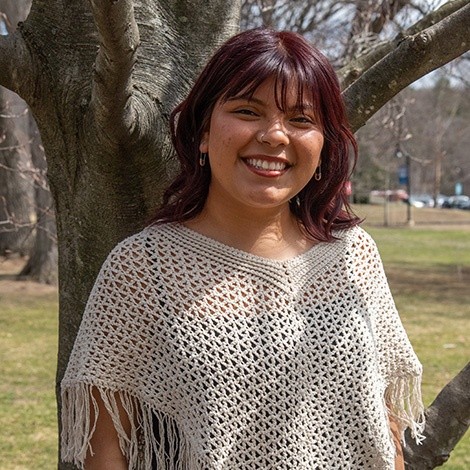Students with no prior knowledge of Spanish must take the placement test to enroll in SPAN-101.
Upon reviewing both the questionnaire and placement test results, the department may require a level change.
Students are strongly encouraged to take their language courses in close succession, without lapses between one level and the next.
Students who have previously taken Spanish courses at Mount Holyoke and who wish to continue their study of Spanish must have the prerequisites stipulated for specific courses.
All courses satisfy distribution requirements unless indicated otherwise.
All courses are conducted in Spanish unless indicated otherwise.
Students contemplating study abroad in Spain or Latin America are encouraged to elect a Spanish course in the first semester of their first year.
SPAN-101 Elementary Spanish
An interactive introduction to the Spanish language and Hispanic cultures. This course emphasizes communication through extensive oral practice in class in order to provide students with an immersion experience. Covers basic grammar structures to equip students to communicate about personal information (description of self and family, routine, preferences) and carry out basic tasks (asking for directions, ordering food, making simple purchases). Students will experience different Spanish varieties within and outside of the classroom through films, short movies, documentaries, poetry, literature, and a broad variety of other written and oral texts.
SPAN-199 Preparation for Intermediate Spanish
A communication-based approach to using the Spanish language and learning about Spanish-speaking communities and cultures, this course emphasizes communication through extensive oral practice in class in order to provide students with an immersion experience. Deepens the students' command of Spanish, builds on content learned in SPAN-101 and expands knowledge of the necessary grammar and vocabulary to equip students to communicate in new social situations beyond elementary Spanish. Students will experience different Spanish varieties within and outside of the classroom through films, short movies, documentaries, poetry, literature, and a broad variety of other written and oral texts.
SPAN-201 Intermediate Spanish
A communication-based approach to using the Spanish language and learning about Spanish-speaking communities and cultures, this course emphasizes communication through extensive oral practice in class in order to provide students with an immersion experience. Strives for mastery of complex grammatical structures and continues working on writing, listening, and reading skills to provide the necessary linguistic and cultural tools to communicate about current social issues. Students will experience different Spanish varieties within and outside of the classroom through films, short movies, documentaries, poetry, literature, and a broad variety of other written and oral texts.
SPAN-209 Composition and Culture
Emphasis on written expression in Spanish through frequent assignments emphasizing difficult grammatical structures or idiomatic usages, sentence and paragraph structure, making smooth transitions, writing the short essay, writing descriptions, engaging in personal or business correspondence, analyzing texts, doing library research, and drafting and completing research papers. Students will comment on each other's work in the classroom and/or via the use of email or Web sites and will practice techniques of self-editing and self-criticism.
SPAN-212 Preparation for Advanced Studies
This course will equip students of Spanish with a variety of skills that prepare them for upper-division courses. Specific areas of study will include introduction to literary genres and movements; practice in critical reading and writing; study of figures of speech, rhetoric, and style; presentation of oral reports; use of library resources. In addition, students acquire basic knowledge of the geography, history, and culture of the Hispanic world.
SPAN-230 Identities & Intersections: An Introduction
A broad introduction to issues of identity (gender, sexual, ethnic, cultural, class, national, religious) in the Spanish-speaking world and their intersections with other dimensions of cultural agency and power differentials. The specific course contents and examples examined will vary each semester.
SPAN-230AN Identities & Intersections: An Introduction: 'Animal Stories'
Throughout history, humans have depended on animals not only to survive but to understand the world and to express feelings and ideas. This course explores Latin American cultural landscapes through the study of our relationships with other animals via literary and visual representations. How does our coexistence with domestic and wild animals interact with how we view spirituality, science and technology, environment, economics, migration, and belonging? We will approach this question through different works, with particular focus on indigenous authors. Students will also have a chance to explore their own relationships with other animals.
SPAN-230GV Identities & Intersections: An Introduction: 'Gendered Violence from Medieval to Contemporary Spain'
This survey course will review the complex interaction of gender and violence as a personal and institutional issue in Spain from Medieval times to the present. What are the ideological and sociocultural constructs that sustain and perpetuate violence against women? What are the forms of resistance women have put into play? Among the texts, we will study short stories by Lucanor (thirteenth century) and María de Zayas (seventeenth century), song by Bebé and movie by Boyaín (twentieth century), contemporary news (twenty-first century), and laws (from the thirteenth century to the present).
SPAN-230HY Identities & Intersections: An Introduction: 'Hybrid Identities of the Spanish-Speaking World'
With a historical and transnational approach, this course will explore bi/multicultural identities and communities in the Spanish-speaking world, primarily of the postcolonial period. Mestizos, Korean-Argentineans, Cuban-Americans, Afro-Peruvians, Moroccans and West Africans in Spanish cities, "gallegos" in Buenos Aires, Chinatowns, Spanglish...Is Catalonia Spain? Through literary, audiovisual, and theoretical texts, we will put situations of ethnic and linguistic hybridity in dialogue with one another and focus on how communities and identities reclaim rights and space, are represented, aspired to, separated, and often slip away when we try to define them.
SPAN-240 Visual Cultures: An Introduction
A broad introduction to the study of visual representation in Latin American, Spanish, and U.S. Latina/o cultures. Students will examine the articulation of a variety of topics in media such as film, television, fine arts, Internet, and/or video. The specific course contents and examples examined will vary each semester.
SPAN-240AR Visual Cultures, An Introduction: 'Occupying the Arts: Activism, Crisis and Arts in Latin America'
In this course we will situate contemporary Latin American arts in a historical and political context -- a moment of rupture that is informed by ongoing histories of racism, colonialism, sexism, authoritarianism, state terrorism, coloniality of power and debt. We will look at non-canonical artists and movements between the sixties and now. What is artistic activism? What is social art? What is the role of creative industries in contexts of political oppression? What happens when art does not simply "talk about politics," but engages in a dialectical practice-moving between action and aesthetics? We will look at visual arts, performance and literature, and paying attention to the consumers.
SPAN-240CN Visual Cultures, An Introduction: 'Latin American Cinema'
This course offers a broad introduction to the history, politics and aesthetics of Latin American cinema through some of its most influential films. We address the revolutionary styles of agit-prop, Neo-Realism and Third Cinema, as well as Hollywood-style melodrama. The course also familiarizes students with the basic terminology, concepts and approaches of film studies.
SPAN-240DQ Visual Cultures, An Introduction: 'Drama Queens: Love, Heartache and Making a Scene'
Movies and television in Spanish are known for serving over-the-top drama. From the histrionics of Mexico's sweeping época de oro productions to the telenovelas of today, melodrama has provided an effective means for understanding not only our own personal affliction but also broader societal issues. Star-crossed lovers, family feuds, a mother's sacrifice, and other common tropes become vehicles for articulating and challenging ideas about socio-economic hierarchies, gender and sexuality norms, racialization, and national identity. This course explores such dynamics in iconic box-office hits, popular television serials, and recent streaming content.
SPAN-240PN Visual Cultures, An Introduction: 'Spanish Cinema'
This course offers a broad introduction to the history, politics and aesthetics of Spanish cinema through its most iconic films. We address the innovations of surrealism, neo-realism, and postmodernism as well as Hollywood-style commercial genres. The course also familiarizes students with the basic terminology, concepts and approaches of film studies in Spanish. Pedro Almodóvar, Luis Buñuel, Isabel Coixet and other directors included.
SPAN-240RE Visual Cultures, An Introduction: 'Representations of Labor in Latin American Cinema'
How do labor relationships and the social construction of what work means affect our lives as well as our communities? How do they contribute to shape our identities? In which ways can our gender, sexual orientation, race, social class or migratory status define our working possibilities? How do the concepts of marginality and informality emerge to identify the precarious Latin American labor conditions? How do labor conditions interact with political and social events? Through Latin American films and short stories, students will problematize the idea of service, worker, industry, classic and non-classic work, sexual and affective work, and child labor, among others.
SPAN-250 Concepts and Practices of Power: An Introduction
A historical approach to the analysis of political discourses and economic relations in Latin America, Spain and Latina/o cultures in the United States. Topics may include, but are not limited to, imperialism, (post/neo)colonialism, (trans)nationalism, migration, globalization, and neoliberalism. The specific course contents and examples examined will vary each semester.
SPAN-250AT Concepts and Practices of Power: 'The Agency of Things: Material Culture of Latin America, Spain, and the U.S. Border'
What is a thing? What is stuff? Water bottles, bread, trash, relics, photos, dirt, a broken printer, your favorite socks... Where do they come from and where are they going? In this course we'll gain an understanding of the political, historical, spatial, and affective agency of objects. We'll study how artists, writers, collectors, hoarders, migrants, and things of modern-day Latin America, Spain, and U.S.-border areas engage with the inanimate things around us. Our study will be enlightened by theoretical discussions on "Object Oriented Ontology," Environmental Humanities, the Anthropocene, everyday life, and automation. Students will also have a chance to decipher the meaning and trajectories of their own "stuff.
SPAN-250LM Concepts and Practices of Power: An Introduction: 'Making Latin America: From Independence to the Present'
This transdisciplinary course is an introduction to Latin America through its cultural production (literature, film, music, painting, dancing, comics, performance, among others). We are going to address some of the most important moments of the continents' history: independence period, modernization, nationalism, Mexican Revolution, Latin America and the Cold War, Cuban Revolution, Literary Boom in Latin America, Southern Cone cultural production during dictatorships, politics of memory, popular media and mass culture. These cultural products and historical moments will also interact with some of the most relevant concepts of gender theory, cultural studies, critical race theory and human rights.
SPAN-260 Studies in Language and Society: An Introduction
A broad introduction to the study of specific form/meaning relations in the linguistic system of Spanish and the function of language in society. Topics may include, but are not limited to, languages in contact, bilingualism, teaching methodology, translation and interpretation, sociolinguistics, phonetics and phonology, morpho-syntax, semantics and pragmatics. The specific course contents and examples examined will vary each semester.
SPAN-260BL Studies in Language and Society: An Introduction: 'Being Bilingual'
This course will introduce students to key issues and concepts in the study of bilingualism with a focus on communities in which Spanish interacts with other languages in Latin America, Spain, and the United States. One of the main goals of the course is to create awareness about the multidimensional nature of bilingualism as an individual, socio-political, cultural, and a psycholinguistic phenomenon. Topics will include degrees of bilingualism and the notion of "bilingual continua", language acquisition and language processing, relations between language and identity, the linguistic effects of other languages in different Spanish varieties, language maintenance and language loss, language policies and bilingual education.
SPAN-260CN Studies in Language and Society: An Introduction: 'Spanish Across the Continents'
This course will introduce students to the various varieties of Spanish throughout the world including North and South America, Spain, North Africa and regions where Judeo-Spanish is spoken. Topics will include the historical reasons for the presence and development of Spanish in different regions and the main causes of language variation, such as contact with other languages and social factors. The analysis of oral texts (audio and video recordings) will be a main component of the coursework.
SPAN-260CW Studies in Language and Society: An Introduction: 'Introduction to Creative Writing in Spanish'
Do you want to discover the creative writer inside of you? Do you want to learn techniques and strategies to play with the Spanish language and write poems or short stories? This course will introduce students to the pleasure of the creative writing process in Spanish. Students will develop the skills for understanding and analyzing the art and craft of writing fiction and poetry by famous writers and to develop the language and confidence to create your own. We will look at literature as writers rather than scholars. Students will learn strategies for experimenting with writing, giving and receiving feedback, and building a literary community.
SPAN-260HL Studies in Language and Society: An Introduction: 'Introduction to Hispanic Linguistics'
The main objectives of this course are to consolidate the knowledge of the language, as well as to help both non-native and native speakers understand and explain how Spanish works as a linguistic system for communication. Topics covered in this course will range from a review of general goals and methods in Linguistics, to phonetics and phonology, morphology and syntax, semantics, and language variation within the Spanish speaking world. The coursework will highlight those grammatical aspects that are typically problematic for learners of Spanish as a second language.
SPAN-260PB Studies in Language and Society: An Introduction: 'Public Speaking in in Spanish'
This course aims to help students develop their understanding of public speaking and improve their delivery skills in Spanish in a variety contexts. A special emphasis will be placed on the concept and practice of ethical communication. Coursework will include planning, presenting, and analyzing oral and written speeches, as well as critical evaluations of famous figures' speeches in Spanish and their particular audience in socio-historical contexts. Assignments will substantially focus on different aspects of the planning process -- such as content research, organization, writing, and the use of visual aids, among others--to create a well-informed, flexible, audience-oriented speech.
SPAN-295 Independent Study
SPAN-330 Advanced Studies in Identities and Intersections
SPAN-330BW Advanced Studies in Identities and Intersections: 'De Brujas and Other "Bad Women" in the Spanish Atlantic'
During the Spanish Empire (15th-18th centuries), women who violated the social order by failing to uphold the expected sexual morality and gender norms of the "ideal woman" were considered a danger or catergorized as "raras". They were silenced, criticized, punished, and some burned at the stake as witches. Students will study contradictory discourses of good and evil and beauty and ugliness in relation to gender in the Spanish Atlantic. We will analyze historical and literary texts as well as film versions of so-called "bad" women -- such as the Celestina, Elena/o de Céspedes, Antonio/Catalina de Erauso and Sor Juana Inés de la Cruz.
SPAN-330SL Advanced Studies in Identities and Intersections: 'Spain and Islam'
This course will explore questions and concerns regarding the "Islamic constant" of Spanish history. We will focus on four major political and cultural contexts: the coexistence and conflicts among Jews, Muslims, and Christians in Medieval Iberia; the "moriscos" (converted Muslims) of Imperial Spain (sixteenth-seventeenth centuries); Spanish orientalism and colonial enterprises in Africa between the end of the nineteenth and the first half of the twentieth centuries; and the question of the Muslim emigrants in contemporary Spain. Readings will include literary texts, political and legal documents, historical accounts, and other cultural material such as architecture, film, and documentaries.
SPAN-330WE Advanced Studies in Identities and Intersections: 'Weird Feelings: Unsettling Latin American Short Fiction'
In this course we will read and discuss a group of short stories written by contemporary female, queer and trans Latin American authors. These stories deal with (among other weird feelings and states) the uncanny, the unsettling and the horror of daily life as well as processes of becoming, embodiment and disidentification. This course considers the intersections of identity and imagination, race, gender, and class. Special attention is given to the way in which these writings depict oppression and resilience and how they reinvent the Latin American short story writing tradition. Authors may include Ivan Monalisa, Guadalupe Nettel, Mariana Enriquez, Camila Sosa, and Claudia Salazar.
SPAN-340 Advanced Studies in Visual Cultures
SPAN-340AR Advanced Studies in Visual Cultures: 'Occupying the Arts: Activism, Crisis and Arts in Latin America'
In this course we will situate contemporary Latin American arts in a historical and political context -- a moment of rupture that is informed by ongoing histories of racism, colonialism, sexism, authoritarianism, state terrorism, coloniality of power and debt. We will look at non canonical artists and movements between the sixties and now. What is artistic activism? What is social art? What is the role of creative industries in contexts of political oppression? What happens when art does not simply "talk about politics", but engages in a dialectical practice-moving between action and aesthetics? We will look at visual arts, performance and literature, also paying attention to the consumers.
SPAN-340DG Advanced Studies in Visual Cultures: 'Indigenous Futures'
This course examines how contemporary artists from the Andes and the Amazon imagine and represent the future of their communities by putting their experiences, aesthetics and epistemologies in dialogue with global issues, such as the environmental crisis. Through analysis of a diverse corpus of works--from Guamán Poma's 17th century drawings, to Daniela Catrileo's 2023 novel Chilco--we will examine how indigenous artists and thinkers have imagined other worlds and realities, and we will explore how these works challenge ideas around race, nation, gender, and class. Students will also have a chance to test their own critical imaginations by producing narratives about the future.
SPAN-340PA Advanced Studies in Visual Cultures: 'Natural's Not in It: Pedro Almodóvar'
This course studies the films of Pedro Almodóvar, European cinema's favorite bad boy turned acclaimed auteur. On the one hand, students learn to situate films within the context of contemporary Spanish history (the transition to democracy, the advent of globalization, etc.) in order to consider the local contours of postmodern aesthetics. On the other hand, the films provide a springboard to reflect on larger theoretical and ethical debates related to gender, sexuality, consumer culture, authenticity, and authorship.
SPAN-340RR Advanced Studies in Visual Cultures: 'Anti-Fascism in Film: Reel Revolutions'
This course analyzes the fight against fascism through the lens of Spanish cinema. Students learn about the history of fascism and anti-fascism in general, Spain's pivotal role in the battle between the two opposing ideologies, the stylistic traits adopted by each in cinema, and how films themselves can wage "reel" revolution. Struggles against capitalism, officially dictated national(ist) histories and cis-hetero-normativity, as well as stances in favor of organized anarchism, are also central to anti-fascist art and politics. The course concludes with reflections on anti-fascism in the Americas, particularly in Argentina, Brazil, Chile, and the United States.
SPAN-350 Advanced Studies in Concepts and Practices of Power
SPAN-350QH Advanced Studies in Concepts and Practices of Power: 'Queering the Horror: Collective Memory, Political Violence, and Dissident Sexualities in Latin American Narratives'
The bloody dictatorships that took place in the Southern Cone and the armed conflicts in Colombia, Guatemala and Peru during the 20th century left behind a legacy of political violence and collective trauma. These states themselves became sadistic death machines, where bodies became territories of punishment and discipline as well as of struggle, resistance, and difference. We will analyze how recent cultural production (film, novel, short stories, and theater) along with theoretical texts imagine and represent those "body struggles" through queer and female bodies, and how they replace the masculine icons of the left-wing militants and the state military terrorists.
SPAN-350UE Advanced Studies in Concepts and Practices of Power: 'Public Space and Everyday Life in Globalizing Spanish Cities'
With a transnational and historical scope, this course will examine everyday life and public space in Spanish cities. We'll approach cities as dynamic global networks shaped by cultures, politics, economies, ideologies, memories, and imaginations. Through literary, visual, and theoretical texts, we'll explore the in/exclusivity of large-scale urban phenomena such as street design, architecture, gentrification, globalization, and mass tourism. From a lesser-known ethnographic angle, we'll also bring into dialogue the power within practices (walking, sitting, remembering, shopping, placemaking) as well as subjects and objects (street vendors, minority identities, urban furniture, buildings).
SPAN-360 Advanced Studies in Language and Society
SPAN-360AV Advanced Studies in Language and Society: 'About Vanguards and Revolutionary Ideas'
This course addresses cultural relations between Latin America and Romance languages and cultures through the concept of vanguard: the Latin American poetic vanguardias of the early twentieth century and controversies with the Italian and Spanish vanguardias; the influence of the Négritude anti-colonial movement in Latin American decolonial thinking and the political avant-garde movements and guerrillas of the '60s and '70s; the intersections between French surrealism and Latin American magic realism; and the emergence of the Cinema Novo and New/Third Cinema (the vanguard of political cinema in Latin America) in the context of Italian neo-realism and the French nouvelle vague.
SPAN-360LG Advanced Studies in Language and Society: 'The Politics of Language'
This course examines how implicit and explicit efforts to manage a language influence speakers' beliefs about a language and language in general and determine access to different forms of power by establishing the hegemony of specific linguistic groups or communities in multilingual settings where Spanish is spoken. We will explore issues such as linguistic imperialism/colonization, linguistic discrimination, links between linguistic and national identities, linguistic human rights movements and the concept of language ecology as providing frameworks for social change through inclusion and political participation.
SPAN-360LT Advanced Studies in Language and Society: 'Romance Languages Translate'
This seminar explores Romance languages, literatures and cultures through the prism of translation. By comparing translations from Spanish, Catalan, French, Italian, Portuguese, and Romanian between each other and into English, we will map out the boundaries, intersections and middle grounds of this language family. Students will engage with the different traditions of translation studies in these languages and critically analyze translators' paratexts. Selecting an individual translation project in a Romance language of their choice, through a process of revision and collaboration, each student will produce both a polished translation and a commentary explaining challenges and choices.
SPAN-360MT Advanced Studies in Language and Society: 'The Mind of the Traveler: Journeys, Expeditions, Tours'
Travel literature has always been a precious source for the study of culture, politics, arts and, last but not least, people. From Tacitus to Marco Polo, from Stendhal to Camilo Jose Cela, we will read and discuss authors who traveled for political, personal, and recreational reasons. We will also pay special attention to tales of emigration and immigration in the third millennium.
SPAN-360SJ Advanced Studies in Language and Society: '(Trans)Languaging Social Justice'
The concept of linguistic justice refers to the right to communicate and engage in the language and variety in which one feels more comfortable and powerful, as the foundation of equitable access to social and political life. Under this framework, this course examines the role of language in promoting or denying social justice. We will explore languaging -- language as a social practice related to constructing meaning and knowledge -- in areas such as education, law, immigration, health care, artificial intelligence, race and ethnicity ideologies, among others. A main goal of this course is to build our critical language awareness through self-reflection to support rhetorical agency for social change.
SPAN-360TR Advanced Studies in Language and Society: 'Into Translation: Connecting Words and Worlds in English and Spanish'
This course will explore the different components of the translation process from a multidimensional perspective: translation as a textual activity, translation as communication, and as a cognitive and learning processes. The main objective will be for students to develop their theoretical and practical understanding of the translation process through the analysis of translations, discussions of the main issues in the field, and extensive practice of translation of different types of texts between English and Spanish.
SPAN-395 Independent Study



